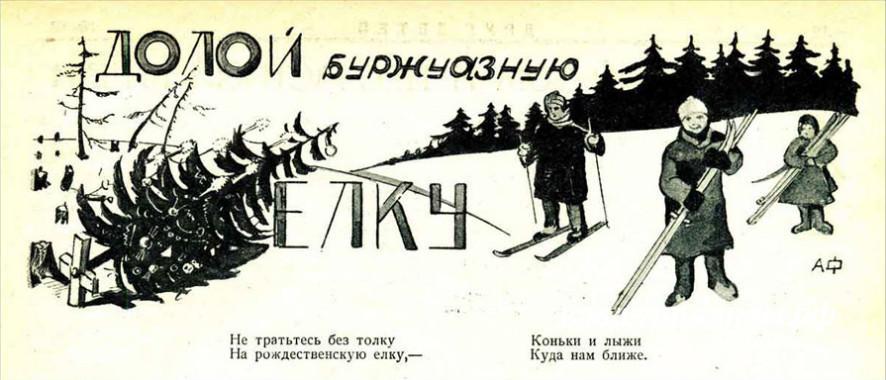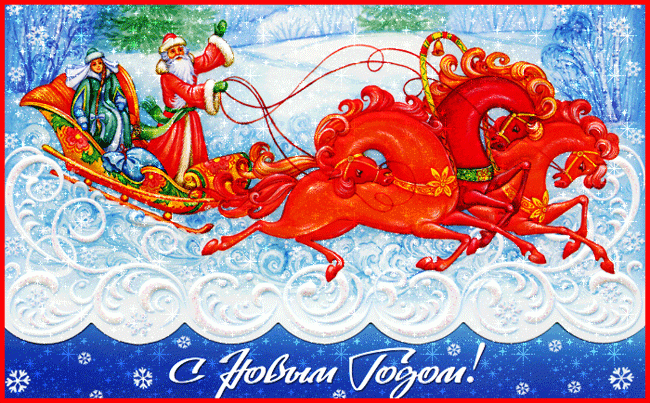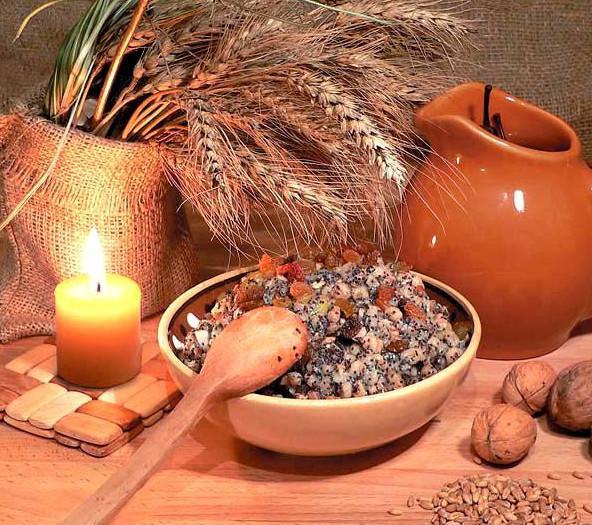In Russia, the main holiday is the New Year, and the tradition of celebrating Christmas [Рождество, Rozh-dest-vO] has suffered significantly in the atheistic Soviet Union. However, the last twenty eight years Russians also celebrate Christmas. For Russian people holiday and fun does not happen much!

[adsense:336x280:6538780580]
The label on the card:
DOWN WITH the bourgeois CHRISTMAS TREE!
Do not waste your time
On Christmas trees, -
Skates and skis
Are much closer to us.
- Great feast of the 1st of January
- Rich New Year's table
- New Year tree
- Patties with wishes
- Snowflakes on the windows
- Message from the President
- Russian New Year Movies
- Ded Moroz and Snegurochka
- Old New Year
- Christmas Vigil Service
- Christmas table
- Christmas carols - Christmas parties
- Special Christmas decorations
- Christmas post
Great feast of the 1st of January
Most countries are fluent in celebrating Christmas on December 25th. But in Russia people celebrate the New Year on January 1st. Why?
To begin with, Tsar Peter First ordered the holiday and the calendar start of the year to be postponed from September 1 to January 1, so that everything would be like in the West. In 1897, the beginning of the new year was officially declared a holiday, and the first day officially became a day off. In 2004, the days of January 5 were declared days off. Russians rest for ten days, because they add Saturdays, Sundays and Christmas.
But all Russian New Year traditions, like New Year trees and a delicious dinner, in most countries are inherent in Christmas. And Russian love the New Year more. The reason for this is the reform of 1918 - the Bolsheviks did not like the religious background of the holiday. And on January 7th, and not at the end of December, as in Catholic countries, because the authorities adopted the Gregorian calendar, and the church remained Julian.
Rich New Year's table
In Russia, it is customary to celebrate the New Year with family or friends. Close people gather together on the evening of December 31st to spend the Old Year and to meet the New Year. And they do not just get together, but at a set table, set with all sorts of festive dishes.
For starters, they usually remember what happened in the outgoing year - good or, conversely, bad. They tell what happened in the life of the important and wish each other happiness. And of course, do not forget to pay tribute to the goodies and alcoholic beverages, which in most families and companies it is customary to buy a lot.
Traditional for the Russian New Year table dishes - salads "Olivier" [Оливье, O-li-v'e] and "herring under a fur coat." And the most "New Year" fruit - tangerines. These dishes became mandatory even in Soviet times. In addition, usually prepare many more intricate time-consuming dishes, some of them can be tried no more than once a year.
Russian Olivier Salad Recipe - салат Оливье
Russian Herring Under Fur Coat Salad Recipe - Салат Селёдка под Шубой
New Year tree
Tradition to decorate a tree for a special, festive day came from the depths of centuries. And decorating for Christmas or Christmas is the fir tree - this is a Christian tradition. According to legend, the holy monk Boniface tried to convert the Druids into Christianity and read the sermon on miracles, in particular, tried to convince the pagans that the oak tree was not a sacred tree. The saint took an ax and cut down one oak, and the one, falling, knocked all the trees in his way. Only spruce survived, and Boniface named it the tree of Christ.
To us the tradition of decorating fir came from Catholicism. At first, fruits were hung on it, then candles were added, but for fragile branches it was all too hard, and glass balls and garlands gradually came to replace.
Now it is impossible to imagine the New Year without New Year tree - it has become one of the most important symbols of the holiday. It is under it that children find presents on the first morning of the coming year. By the way, gifts are another important tradition. If you have not prepared them for all the dear people, then it's time to start.
Another thing about New Year and Christmas in Russia. If you are Russian and live in America you can take advantage of Americans not really celebrating the New Year. Some people who are originally from Russia but live in United States, they don't buy every Christmas tree because they just wait till Christmas is over then they go out in the street and they pick up free Christmas tree wich they take home and turn out the New Year tree. Now tree is supposed to stay all the way to the Old New Year so you have to stretch it for two weeks from January 1 all the way to January 14. That's why in Russia for the New Year tree people prefer the pine because pine tends to hold their needles way longer than them for so pine is perfect ball tree. It's not as pretty but it stays longer without dropping the needles.
Patties with wishes
In many families it is customary for the New Year's table to bake special pies (пирожки, pi-rash-KI) with wishes: a piece of paper in a foil is wrapped in a pie, on which a pleasant wish is written. You can wish for anything - to help come fantasy.
Instead of a wish, there is a surprise. For example, in one pie from a large batch put a coin, one bake is very salty, and another one - very sweet. Anyone who pulls a pie with a coin under the chiming clock will be rich this year. Salted pie symbolizes difficulties and trials, sweet - "sweet" life.
By the way, it can be not only a patty. In some families, for the New Year, they make concocted ravioli, among which the "lucky one" will get a dumpling pelmeni. The one who gets it will be lucky in the New Year.
Snowflakes on the windows
Snowflakes on the windows can not be found outside of Russia and other countries of the former Soviet Union. Our snowflakes are special. We ourselves cut them out of paper, we paste them on the windows, so that the atmosphere in the house becomes even more festive.
Message from the President
It can not be said that the New Year's address to the people of the head of state exists only in Russia - in other countries this is also a common thing. Nevertheless, in Russia, a special attention is paid to the parting presidential speech. On December 31, at 23.55 on several channels, the head of the country addresses citizens with a speech, where he usually summarizes the results of the year.
After the Kremlin chimes they beat 12 blows, marking the beginning of the new year. Then plays the national anthem of the country, and in all houses and restaurants people raise glasses, "clink glasses", congratulate each other. This is how the New Year comes.
New Year's message from Putin to US residents
Russian New Year Movies
In Russia people have there is one actually a famous movie which everybody is watching before the New Year. It's a famous comedy "The Irony of Fate, or I Hope You've Enjoyed Your Bath" (Ирония судьбы или с лёгким паром), it has a lot of famous catch phrases that every Russian repeats and it's pretty good show. That's also a lot of people watching it's like a part of the New Year tradition to watch this movie on a New Year night.
"The Irony of Fate, or I Hope You've Enjoyed Your Bath" with Russian and English subtitles
Ded Moroz and Snegurochka
'Grandfather Frost' (known in Russian as 'Ded Moroz' or Дед Мороз) is the main character of the New Year, a kind fair old man with a white beard in a red, white or blue fur coat and felt boots. The Ded Moroz is riding on a troika of horses, and the grandson of the Snow Maiden helps him.
Initially, Ded Moroz would be a powerful pagan god and personification of Russian frosts. He bound the water with ice, covered the ground with snow, and also protected from enemies - if they attacked Russia, then sent terrible colds, which the alien could not cope with.
Under the influence of Christianity, Grandfather "became angry" and became just an evil and eccentric spirit. "Again," it again, the Bolsheviks as a symbol of the holiday, and since the 1930s to represent the New Year without Grandfather Frost is no longer possible. By the way, he has an official residence in Veliky Ustyug, his own mail and his birthday on November 18 - according to statistics, about the time when Great frosts come in Veliky Ustyug.
The Grandaughter (Snegurochka [snee-GOO-rahch-ka]) accompanies Father Frost since 1937. The origins of its image also lie in pagan mythology. Such a Snow Girl is an exclusive Russian character.
There are several legends and tale stories about Snegurochka. In one of the stories she is a daughter of an old man and a woman who never had any children, so they made a girl out of snow and called her Snegurochka. The spring came and she became very sad. And then one day she was playing with the girls in the woods, and they were playfully jumping over the fire, so she jumped too and she melted immediately and became a cloud… Snegurochka become famous in the 19th century when Александр Островский wrote famous play “Снегурочка”. In the story she is the daughter of Frost and Spring and she wants to fall in love more than anything else. But as soon as she does, she melts and turns into a cloud. Modern Snegurochka appeared at the beginning of the 20th century as a granddaughter of Ded Moroz who brings presents for New Years Eve.

Old New Year
And one more feature inherent only in Russia and the ex-USSR countries is the Old New Year. This funny oxymoron and an amazing tradition came about because of the differences in the Julian and Gregorian calendar. The church continues to use the Julian calendar, and the new year comes "according to the old style", so it falls on Christmas.
And in Russia people like holidays very much. So after the decree of Peter First the Russians gladly began to celebrate the secular New Year on January 1, but they did not forget the "church" feast in January, so that they would surely observe all traditions. And it has got accustomed - we have celebrated both holidays for 300 years already.
Christmas Traditions
Christmas Vigil Service
Orthodox Christians celebrate Christmas on the 7th of January, and the 6th day is Christmas Eve (from the word "osovo" - a special cereal of wheat grains and juice of seeds). Christmas Eve is the last day of the Christmas fast (which in Russia is rarely observed, because its middle is in the New Year) and Christmas Eve.
On the night of 6th to 7th January, all the Orthodox churches in Russia serve the All-Night Service. It begins in the evening and lasts about three hours. Then they serve the liturgy, and right after it comes Christmas. People congratulate each other and go home for to talk. On the morning of the 7th of January another liturgy is served.
Christmas table
On Christmas it is customary to set a special table, which is very different from the New Year. On Christmas Eve you need to cook sochivo (a dish of boiled wheat, rye or oats mixed with honey, porridge mixed with honey). You can not eat on this day, until the first star appears in the sky.
Also for Christmas bake wafers - thin round slices of fresh dough. They put them on clean hay in the middle of the table. The wreath symbolizes the baby Jesus in the manger. During the dinner, you should break the cotte with the companions and wish them all the best from the heart.
First eat sochivo. Then serve hearty snacks like salads and herring. Then - soup and patties. And at the end of the meal on the table display sweet dishes - honey cakes, poppy rolls, nuts, kissels, cookies.
It is important to try every dish, even a little. And yes - no alcohol, meat, milk or sour cream. If a guest comes, then he must be invited to the table - at Christmas it is customary to feed everyone. Some also feed birds and stray animals.

Christmas carols - Christmas parties
Now caroling is rare, especially in big cities, but before that it was a fun and beloved period, coming right after Christmas and lasting until Baptism. He is called Christmas-tree. At that time they used to dress up in different costumes, play funny games on the streets, sing, dance dances and congratulate everyone on the fact that the winter has finally come to a halt and it's coming to spring.
Christmas carols were fun, festivities. People skated from the slides and arranged abundant feasts. However, nothing prevents us from returning the tradition and having fun from the heart in the last days of the New Year holidays.
Special Christmas decorations
Christmas decorations are similar to New Year's, but there are differences. For example, in Christmas put candles around the house, hang stars and wreaths, decorate the house with images and figures of angels. In fact, you can simply supplement the New Year's decoration of the house. Garlands are best cleaned - candles will be enough.
Traditionally, red and gold are considered Christmas colors. The more of them, the more festive the atmosphere.
Christmas post
The Christmas party lasts from November 28 to January 6. During this period, one should refrain from abundant food, exclude from the diet meat, dairy products and eggs. However, in view of the fact that the post is just on New Year's Eve, it's difficult to resist.
But if you still want to touch this sacrament, keep in mind: fasting is not just abstinence from certain foods. John Chrysostomos (Zlatoust) said that "the true fast is the removal from evil, the curbing of the language, the deposition of anger, the taming of lusts, the cessation of slander, lies and perjury."
It's true. Holidays, especially the New Year and Christmas - is an opportunity to become kinder, enjoy life more and forgive all old grievances. This is an opportunity to start life from a new page. That is the most important tradition. Be kinder, and have a good holiday! Holiday greetings!
And remember Russian New Year's axiom:
Как Новый год встретишь, так его и проведёшь. [kak NO-vi-y god VSTRE-tish' tak ego i pro-ve-DYOSH'] - The way you meet the New Year is the way you will spend it.
What New Year's and Christmas traditions do you have in your country?
